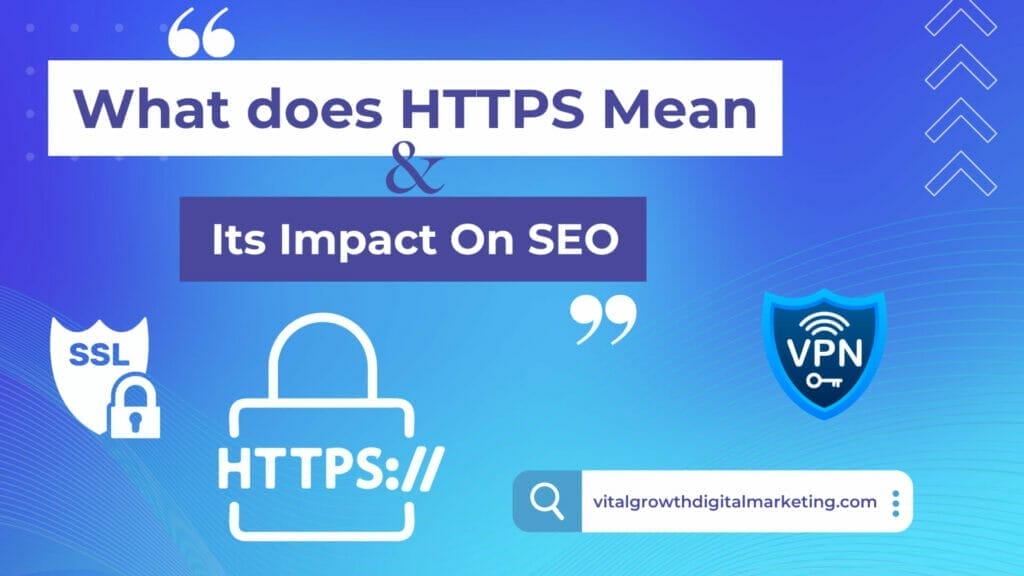In the world of the internet, security is a top priority. You’ve probably seen the letters “HTTPS” at the beginning of a website URL, but have you ever wondered what they mean and why they matter for SEO?
What does HTTPS mean? HTTPS stands for Hypertext Transfer Protocol Secure, a protocol used to encrypt data between a website and its visitors. This encryption helps to protect sensitive information, such as login credentials and credit card numbers, from being intercepted by hackers.
HTTPS isn’t just important for security. It also matters for SEO, and here’s why: Google has clarified that they prefer secure websites over non-secure ones. Google’s search algorithm considers a website’s security when determining its ranking in search results.
So, if you want your website to rank higher in search results and attract more traffic, implementing HTTPS is necessary. But how do you do it? Don’t worry; we’ll cover that in our upcoming blog posts.
Stay tuned to learn more about HTTPS, why it matters for SEO, and how to implement it on your website. Trust us. Your visitors will thank you for the added security and peace of mind.
What Does HTTPS Mean and How It Can Benefit Your SEO Strategy
When it comes to SEO, many website owners focus on optimizing their content and keywords to rank higher in search results. However, website security is one often overlooked factor that can significantly impact SEO. This is where HTTPS comes in.
HTTPS (Hypertext Transfer Protocol Secure) is a protocol used to encrypt data between a website and its visitors. This added layer of encryption helps protect sensitive information, such as login credentials and credit card numbers, from being intercepted by hackers.
But how does HTTPS benefit your SEO strategy? For starters, Google has clarified that they prefer secure websites over non-secure ones. Google’s search algorithm considers whether a website is secure when determining its ranking in search results. Websites with HTTPS have been shown to rank higher in search results than non-secure sites, all other factors being equal.
HTTPS can also benefit your website’s user experience, which is another important factor in SEO. Websites that are secure and trustworthy are more likely to be visited by users, who are more likely to stay on the site longer and engage with its content. This increased engagement can lead to more backlinks, social shares, and other positive signals that can further boost SEO.
Another important factor to consider is the potential negative impact of not having HTTPS on SEO. Non-secure websites may receive warning messages from browsers, which can deter visitors from accessing the site. Additionally, if your website collects sensitive information and is not secure, you could face penalties or legal action under data protection regulations.
Implementing HTTPS is important for any website owner looking to improve their SEO strategy. By securing your website and providing a safer, more trustworthy user experience, you can boost your search rankings and attract more traffic.
HTTP vs. HTTPS
The difference between HTTPS and HTTP is a critical one when it comes to website security.
HTTP (Hypertext Transfer Protocol) is the traditional protocol for transmitting data between a website and its users. HTTP is not secure, meaning that any data transmitted between the website and users is not encrypted and can be intercepted by hackers.
HTTP Example:
http://www.website.com
Note the missing “s” in http://
HTTPS (Hypertext Transfer Protocol Secure), on the other hand, is a protocol used to encrypt data transmitted between a website and its users, adding a layer of security. The added security makes it more difficult for hackers to intercept sensitive data, such as credit card numbers, login credentials, and other personal information.
HTTPS Example:
https://www.website.com
Note the “s” in https://
The primary difference between HTTPS and HTTP is the presence of an SSL (Secure Sockets Layer) certificate. SSL certificates are digital certificates issued to a website by a trusted Certificate Authority (CA). These certificates prove that the website is legitimate and trustworthy, allowing it to establish a secure connection with its users.
How HTTPS Works
HTTPS, or Hypertext Transfer Protocol Secure, is a protocol used to encrypt data that is transmitted between a website and its visitors. Here’s a breakdown of how it works:
- Handshake Protocol: When users enter a website with HTTPS, their browser initiates a connection with the web server, and a “handshake” begins. During this process, the browser and server exchange digital certificates to verify each other’s identity. This ensures that the user communicates with the intended website and is not an imposter.
- Encryption: Once the browser and server have established a secure connection, they begin encrypting the data transmitted between them. This encryption ensures that any data sent between the browser and server is unreadable by anyone who might intercept it. The encryption is accomplished through SSL (Secure Sockets Layer) or TLS (Transport Layer Security) protocols.
- Decryption: When the data arrives at its destination, it is decrypted using a private key that only the web server can access. This ensures that only the intended recipient can read the transmitted data.
- Secure Connection: With the data encrypted and decrypted on either end, the user can interact with the website as usual, secure that their data is being transmitted over a secure connection.
Overall, HTTPS provides security and privacy for users and their data. HTTPS helps protect against potential cyber-attacks and data breaches by encrypting data transmitted over the internet. This is why HTTPS is so important for website security and why it’s becoming increasingly essential for website owners to implement it on their sites.
What You Need to Know About the Benefits of Secure Browsing
In today’s digital age, secure browsing is becoming increasingly important as online threats and cyber attacks continue to rise. As a website owner or user, there are many benefits to using secure browsing, and understanding these benefits is crucial to maintaining a safe and trustworthy online presence. Here’s what you need to know about the benefits of secure browsing:
- Protection of sensitive data: Secure browsing, often implemented through HTTPS, encrypts all data transmitted between a website and its users. This includes passwords, credit card numbers, and personal data. By encrypting this data, secure browsing helps protect against potential cyber-attacks and data breaches.
- Improved search rankings: Google and other search engines prefer secure websites, meaning that websites that use HTTPS are more likely to rank higher in search results. This can lead to increased traffic and better overall performance for website owners.
- Increased user trust: By displaying the padlock icon and “Secure” message in the browser address bar, HTTPS can assure users that your website is legitimate and that their data is protected. This can help to build trust with users, increasing the likelihood that they will return to your site in the future.
- Protection against online threats: Secure browsing can help protect against many online threats, including phishing scams, malware, and other cyber attacks. By encrypting data and verifying website identity, secure browsing helps ensure that users interact with legitimate websites and that their data is kept safe.
- Compliance with regulations: There are strict regulations around handling sensitive data in many industries. Implementing secure browsing through HTTPS is often required to comply with these regulations, meaning that website owners who do not use HTTPS could face legal penalties.
The Relationship Between HTTPS and Higher Keyword Rankings
The relationship between HTTPS and higher keyword rankings is important for website owners and marketers to understand. While it’s clear that using HTTPS can improve a website’s search engine optimization (SEO) and boost its ranking in search results, a few key factors contribute to this relationship.
One factor is using HTTPS signals to search engines that a website is secure and trustworthy. Google and other search engines prioritize secure websites, and using HTTPS can give a website a boost in search rankings. In addition, secure websites are more likely to be visited by users, who are more likely to stay on the site longer and engage with its content. This increased engagement can lead to more backlinks, social shares, and other positive signals that can further boost SEO.
Another factor is that using HTTPS can help to improve website speed and performance. Websites that use HTTPS typically load faster than non-secure sites, which can positively impact SEO. This is because website speed is a key factor in search engine rankings, and faster-loading websites are more likely to rank higher in search results.
However, it’s worth noting that the relationship between HTTPS and higher keyword rankings is not necessarily direct. Implementing HTTPS will not automatically improve a website’s SEO or cause it to rank higher in search results. Other factors, such as high-quality content, strong keyword targeting, on-page SEO, and effective link-building strategies, are also important for SEO success.
Is An HTTPS Worth the Investment for Your Website?
In today’s digital landscape, website security is paramount, and HTTPS (Hypertext Transfer Protocol Secure) is a powerful tool for enhancing website security and SEO. As a website owner, you may wonder if the investment in HTTPS is worth it. The answer is a resounding yes.
While the cost of implementing HTTPS may vary depending on your website’s size and needs, many web hosting providers offer free SSL certificates. This makes the cost of implementing HTTPS minimal, if anything at all. Furthermore, in many industries, using HTTPS is often required for compliance with regulations, meaning that not using HTTPS could result in legal penalties.
Avoiding Common HTTPS Mistakes
HTTPS (Hypertext Transfer Protocol Secure) is becoming increasingly important for website security, and many website owners are switching to HTTPS to enhance their website’s security and SEO. However, the process of implementing HTTPS can be complex, and there are common mistakes that website owners can make along the way. Here are some common HTTPS mistakes to avoid:
- Failing to verify SSL certificate: When implementing HTTPS, it’s important to verify the SSL certificate to ensure that it is legitimate and issued by a trusted Certificate Authority (CA). Failing to do so can leave your website vulnerable to cyber attacks and compromise the security of your users’ data.
- Mixed content errors: Mixed content errors occur when a website is not fully secured with HTTPS, meaning that some resources, such as images or scripts, are still loaded over HTTP. This can result in a warning message in the browser address bar, harming your website’s reputation and discouraging users from visiting it.
- Failing to update internal links: After implementing HTTPS, it’s important to update any internal links that may be affected by the change. Failing to do so can result in broken links and negatively impact your website’s user experience.
- Not redirecting HTTP to HTTPS: After implementing HTTPS, it’s important to redirect any HTTP traffic to HTTPS. Failing to do so can result in duplicate content issues and negatively impact your website’s SEO.
- Using outdated SSL/TLS protocols: SSL and TLS protocols encrypt data transmitted over HTTPS, and it’s important to use the latest, most secure versions of these protocols. Failing to do so can leave your website vulnerable to cyber attacks.
Trends and Innovations in Website Security and SEO
Website security is a constantly evolving field, and new trends and innovations are emerging all the time. As online threats and cyber-attacks become increasingly sophisticated, website owners must keep up with the latest security trends and innovations to protect their websites and users. Here are some recent trends and innovations in website security:
- Advanced machine learning and artificial intelligence (AI): Machine learning and AI are increasingly used in website security to detect and prevent cyber attacks in real time. These technologies can identify unusual behavior patterns and automatically respond to potential threats, making website security more proactive and effective.
- Multi-factor authentication (MFA): Multi-factor authentication is becoming more common in website security, adding an extra layer of protection to user accounts. This involves requiring users to provide more than one form of authentication, such as a password and a fingerprint, before accessing their accounts.
- Integration with cloud-based services: Many website owners are turning to cloud-based security services, which can provide comprehensive security features and automatic updates. These services can be more cost-effective and easier to manage than traditional on-premises security solutions.
- Containerization and virtualization: Containerization and virtualization technologies are increasingly used to create secure environments for web applications. By isolating web applications in containers or virtual machines, website owners can minimize the risk of cyber-attacks and improve their overall security.
- Privacy and compliance regulations: As privacy concerns grow and new regulations are implemented, website owners must ensure that they comply with all relevant regulations. Innovations in website security include the development of compliance management tools and services to help website owners manage their compliance requirements.
Website security is an ever-evolving field, and website owners must keep up with the latest trends and innovations to protect their websites from potential cyber-attacks.
Exploring Additional Measures for Securing Your Website and Protecting Your SEO
In addition to using HTTPS to secure your website and protect your SEO, there are a number of additional measures that website owners can take to enhance website security and protect against potential cyber attacks. Here are some additional measures for securing your website and protecting your SEO:
- Use strong passwords and two-factor authentication: Passwords are one of the most common ways hackers gain access to websites. Using strong passwords and implementing two-factor authentication can help prevent unauthorized access to your website and protect against potential cyber-attacks.
- Keep your website software up-to-date: Keeping your website software up-to-date is essential for protecting against potential vulnerabilities and exploits. This includes updating your content management system, plugins, and other third-party software used on your website.
- Implement website security tools: Several website security tools can help protect your website from potential cyber-attacks. These include firewalls, anti-malware software, and intrusion detection systems. One we use, constantly is Wordfence.
- Back up your website regularly: Regularly backing up your website can help protect against potential data loss and make it easier to recover during a cyber attack or other disasters.
- Monitor your website for suspicious activity: Regularly monitoring your website for suspicious activity, such as unusual traffic or login attempts, can help you identify potential cyber-attacks and take action to prevent them.
- Use A CDN: One additional measure website owners can take to secure their website and protect their SEO is using Content Delivery Networks (CDNs). A CDN is a network of servers distributed worldwide that can deliver website content more quickly and efficiently to users, improving website speed and performance. CDNs can also help protect against Distributed Denial of Service (DDoS) attacks by spreading traffic across multiple servers.
Conclusion: What Does HTTPS Mean and Why It Matters for SEO
What does HTTPS mean? HTTPS is an essential component of any website’s security and SEO strategy. By providing an added layer of encryption, HTTPS helps protect sensitive information and builds trust with website visitors and search engines. With Google and other search engines favoring secure websites, implementing HTTPS is necessary for improving search rankings and driving more traffic to your website.
If you’re looking to implement HTTPS on your website or need help improving your SEO, Vital Growth Digital Marketing can help. Our experienced team of SEO experts can work with you to develop a customized SEO strategy that will drive results for your business. Contact us today to learn more about our SEO services and how we can help your business grow.












